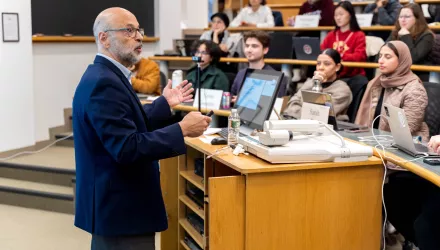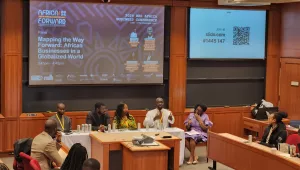Only two weeks following national elections in Nepal, the country’s Ambassador to the US, Dr. Shankar P. Sharma, addressed an audience of Nepali ex-patriots, Harvard Kennedy School students and expert faculty at a presentation jointly hosted by the Kennedy School’s India and South Asia Program, the South Asia Institute and the Center for Public Leadership in an “off-the-record” presentation on December 3, 2013.
In his talk, the Ambassador reflected on Nepal’s recent history, including the rise and fall of the Maoist Party from 2006 to the present, the effects of the creation of the republic in 2008 and the protracted – then failed – efforts to give the country its first constitution. He expressed optimism that the now-forming Constituent Assembly, elected in the November 19, 2013 vote would be able to steer a constitutional process based around multi-ethnic federalism, which seemed to be the expressed will of the people.
Economic challenges would likely determine the ability of the country to forge inclusive growth, he noted. The Nepali Congress party and the United Marxist Leninist Party had differing views on how best to steer economic progress and address the country’s youth bulge. He noted the country’s core sectors – tourism and hydro-power – but underlined its continued dependence on its international support from national aid agencies, including USAID and DFID in the UK alongside major international lenders. In order to take full advantage of the four-year timeline to develop a new constitution, he suggested, the political elite of Nepal need to continue to overcome the disagreements and issues which plague nascent democracies and agree on an accepted system of governance.
Clüver Ashbrook, Cathryn. “Nepali Ambassador Visits Harvard.” December 5, 2013





